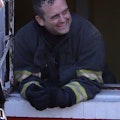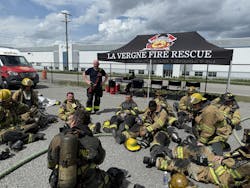How One Department Develops Leaders With an Educational Culture
Key Takeaways
- In the same way that the La Vergne, TN, Fire Department expects its firefighters to pull a handline without direction, it wants its officers to understand budgets and proposals.
- Academic education is seen as training, in the same way that members train on forcing a door—different scenario but still building muscle memory.
- Placing members who seek promotion opportunities in an academy classroom provides those members with the opportunity to work in a team environment, express their ideas in a meaningful way and receive information from others that they might not have considered.
The fire service has seen a major cultural change during my career. In my department, I often find myself riding on a pumper where I have as many years of service as everyone else in the company combined. I imagine that this isn’t a unique experience.
The apparent problem that many of us faced before lies just in front of us again: How do we prepare for the inevitable knowledge gap that will occur when those who have years of experience retire? Succession planning down to the firefighter level is highly important. My department has decided to seek a solution early by prioritizing education as a foundation of our culture.
Academic education as “training”
Cultural shifts are difficult and can take years. I’ve been told by every person in the fire service who I respect that changing a department is akin to steering a battleship, not a speed boat. Further, the mention of education as a priority quickly can be received as not prioritizing physical training. After all, firefighting is a “blue collar job.” I’d argue, however, that we must reframe what education means in the fire service.
In my department, we decided that we will prioritize consistent physical training and academic critical thinking. We want to create smart, problem-solving firefighters. We want our newest members to know not only how to control a door but why it’s so important.
This shift to education and physical training being of equal importance must be delivered to all of our personnel, from our administrative assistants to our highest operational levels, down to our probationary members in the companies. Everyone is equal in their opportunities to grow and strengthen their critical-thinking skills. The company officers must be able to communicate well, not only to their company but to their supervisors. In the same way that we expect firefighters to pull a handline without direction, our officers must understand budgets and proposals. By having middle management and those who are above them take academic learning more seriously, we are finding that our successes are growing within the department and within our city government.
To that end, we increased our requirement for promotion to management-level positions. It now requires an associate degree at the battalion chief level. As we continue to look forward, this likely will be increased to a bachelor’s degree, and the company officer level will be brought up to require an associate degree.
I understand the argument that’s been used a hundred times before, but hear me out: When you move to a management position, particularly in a smaller department, you interact with higher-level players in the city, i.e., your boss’s bosses. You might be on a committee where you have a real effect on decisions that can affect your department for a decade. You must be able to communicate your needs clearly in a professional and clear way. An associate degree in math or science might not focus on these skills, but the essays that you write and the interactions that you have with other students and professors provide the opportunity to strengthen that skill set. Academic education can be seen as training in the same way that we continue to train on forcing a door or pulling a handline—different scenario, still building the muscle memory.
Parallels
When members want to take a company officer exam, they must prepare for the testing by running scenarios in which they make fireground decisions based on critical thinking to accomplish tactics and strategies. To succeed, they must draw on their experiences and apply those lessons learned in a calculated and thoughtful way.
Currently, my department sends those who seek promotion opportunities to our state academy to receive classroom-based education and experience. By placing them in a classroom with others, they can participate in discussions that allow them to train on working in a team environment, expressing their ideas in a meaningful way and receiving information from others that they might not have considered or experienced.
When a culture that prioritizes academic education in this way is built, it’s much easier to see the parallels to physical training. They are of equal importance. How to force a door properly, how to propose a new standard operating guideline: Both of equal importance and both affect how we perform on the fireground.
Mentoring degree pursuit
By driving members to receive a higher education, my department also created opportunity for organic mentorship. Many who are in the fire service had degrees prior to needing them for promotion. These people successfully navigated collegiate life, both at traditional and online-based universities, including applying for financial aid. Those who look to move to the next level must feel that they can turn to their superiors with any questions that they might have. Members must be empowered to accomplish their goals.
At my department, when we hear that a firefighter is considering working toward a degree, we take that opportunity to let that member know that we can help with questions or point the individual in the direction of someone who can. We provide positive reinforcement with career goals. Many of you who are reading this article have seen this before from your own mentors. For example, when you wanted to learn more about elevating your live-fire training, you knew who to turn to, and if that person couldn’t help immediately, that individual pointed you in the right direction for success. Remember your first fire and someone taking you down a hallway? “Come with me, we’re good.” When it comes to members considering a degree, take their hand and guide them through the process. This creates a sense of trust and builds a stronger bond within the company, district, battalion, etc. It also helps the people who have been in the department for a while feel invested. It keeps them engaged and active.
In my experience, it always is difficult to motivate older members to train on a basic firefighting task. They’ve been there, done that. However, when they get out and start putting their hands on and leading those who are younger than they are, those older members walk away feeling accomplished and having had a good time. Embrace that feeling in all things we do. Eventually, mentorship becomes second nature, something that we just do.
Prepare others to take your place
Changing department culture is difficult. It takes time, failing, succeeding and then failing again. There will be kick back, good and bad opinions, griping and praise. It’s even more difficult when the change pushes people outside of their comfort zone and into areas that they never thought they’d be in with a “blue collar job.”
Stay consistent, precise and determined in your physical training and move that same aggressive mindset toward critical thinking, professional communication and the encouragement of growth. Invest in your department’s future. Teach others what you know, where to find information and how to succeed in their career. Take them down the hot hall, help them up the ladder. If you truly want buy-in to a citizen-first, aggressive mindset, you must prepare others to take your place. The department was there before you, and it will be there long after you’re gone. Make sure that you leave it in good hands.
About the Author

Timothy Cole
Timothy Cole serves as a lieutenant with the La Vergne, TN, Fire Department, where he helps to develop and deliver classes in its recruit academy and presents departmentwide trainings and lectures for local and state level audiences on training and educational growth in the fire service. Cole has served in both volunteer and career capacities. He earned a Bachelor of Science from Middle Tennessee State University and is an accredited Fire Officer through the Center for Public Safety Excellence.
